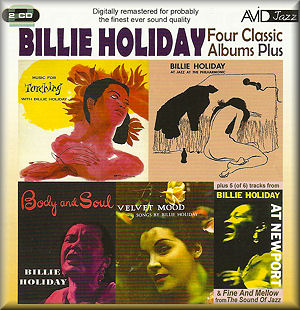CD1
Body and Soul
1. Body and Soul
2. They Can't Take That Away from Me
3. Darn That Dream
4. Let's Call the Whole Thing Off
5. Comes Love
6. Gee, Baby, Ain't I Good to You
7. Embraceable You
8. Moonlight in Vermont
Ella Fitzgerald & Billie Holiday At Newport
9. Willow Weep for Me
10. My Man
11. Lover, Come Back to Me
12. Lady Sings the Blues
13. What a Little Moonlight Can Do
Billie Holiday At Jazz At The Philharmonic
14. Body and Soul
15. Strange Fruit
16. Travelin' Light
17. He's Funny That Way
18. The Man I Love
19. Gee, Baby, Ain't I Good to You
20. All of Me
21. Billie's Blues
CD2
Music for Torching
1. It Had to Be You
2. Come Rain or Come Shine
3. I Don't Want to Cry Anymore
4. I Don't Stand a Ghost of a Chance with You
5. A Fine Romance
6. Gone with the Wind
7. I Get a Kick Out of You
8. Isn't This a Lovely Day
Velvet Mood
9. Prelude to a Kiss
10. When Your Lover Has Gone
11. Please Don't Talk About Me When I'm Gone
12. Nice Work If You Can Get It
13. I've Got a Right to Sing the Blues
14. What's New
15. I Hadn't Anyone till You
16. Everything I Have Is Yours
17. Fine And Mellow (from
The Sound Of Jazz)
Billie Holiday - Vocals
Harry "Sweets" Edison - Trumpet (tracks I/1-8, II/1-16)
Ben Webster - Tenor sax (tracks I/1-8, II/17)
Jimmy Rowles - Piano, celeste (tracks I/1-8, II/1-16)
Barney Kessel - Guitar (tracks I/1-8, 16, 17, II/9-16)
Red Mitchell - Bass (tracks I/1-8)
Alvin Stoller - Drums (tracks I/1, 3. 5. 8)
Larry Bunker - Drums (tracks I/2, 4, 6, 7, II/1-16)
Mal Waldron - Piano (tracks I/9-13, II/17)
Joe Benjamin - Bass (tracks I/9-13)
Jo Jones - Drums (tracks I/9-13, II/17)
Howard McGhee - Trumpet (tracks I/14, 15)
Willie Smith - Alto sax (tracks I/14, 15)
Illinois Jacquet - Tenor sax (tracks I/14, 15, 18-21)
Wardell Gray - Tenor sax (tracks I/14,15)
Trummy Young - Trombone (tracks I/16, 17)
Kenny Kersey - Piano (tracks I/16-21)
Charlie Drayton - Bass (tracks I/16, 17)
Jackie Mills - Drums (tracks I/16, 17?)
Joe Guy - Trumpet (tracks I/18-21)
Georgie Auld - Alto sax (tracks I/18-21)
Lester Young - Tenor sax (tracks I/18-21, II/17)
Al McKibbon - Bass (tracks I/18-21?)
J. C. Heard - Drums (tracks I/18-21?)
Benny Carter- Alto sax (tracks II/1-16)
John Simmons - Bass (tracks II/1-16)
Doc Cheatham - Trumpet (track II/17)
Coleman Hawkins - Tenor sax (track II/17)
Vic Dickenson - Trombone (track II/17)
Danny Barker - Guitar (track II/17)
Jim Atlas - Bass (track II/17)
If any singer could be said to have a "lived-in" voice, it is Billie Holiday. The sadness and perturbation she experienced in life are there in her vocals for everyone to hear. And when her voice rises upwards, it is like a shaft of sunlight breaking through on a cloudy day: expressing the hope that springs eternal despite everything that one suffers.
The recordings on this double album span a dozen years: from 1945 to 1957 - two years before she died. However, the tracks are not arranged chronologically (which might have been helpful) and the sleeve-notes are equally haphazard. In fact the earliest recfordings are the ones when Billie performed as part of Norman Granz's Jazz at the Philharmonic package. The recordings actually come from three JATP sessions: one in 1945 and two in 1946, with some doubt about the backing personnel.
One can forget these doubts as Billie sings some of her most popular songs - including Strange Fruit, Travelin' Light and Billie's Blues. The audeince is more vociferous than on the rest of the album, but their enthusiasm is understandable, since Billie conveys the songs with the utmost emotion. Her often quavering voice movingly expresses the suffering she has endured as well as the way that she can still smile wryly at fate.
Billie Holiday was nicknamed "Lady Day" by tenor-saxist
Lester Young, one of her closest friends, who is present on the classic
recording of Fine and Mellow which closes this collection.
On the first eight tracks - from the 1957 album Body and Soul
- another tenorist, Ben Webster, fits in perfectly because he even
manages to sound like Lester. Harry Edison's accompanying contributions
show why Frank Sinatra wanted Edison in the backing bands on some
of his albums, as Harry fits in with sweet, well-chosen phrases which
earned him his "Sweets" nickname. I like the way he starts
his solo on Darn That Dream with a quotation from It Might
as Well be Spring. And note how, even this late in her career,
Bilie was phrasing daringly, somethimes hovering around a note before
she hits it precisely.
The tracks recorded at the Newport Jazz Festival in July 1957 were included on an album which I have already reviewed (http://www.musicweb-international.com/jazz/2009/Billie_Holiday_LHJ10355.htm). Most of these tracks are quiet and understated, but a song like My Man is almost heart-breaking as Billie captures its conflicting emotions, which reflect her own life. My only complaint with these tracks is that Mal Waldron's piano backing seems too light-hearted for the poignancy in the songs.
Most of the tracks on the second CD come from two 1955 LPs: Music for Torching and Velvet Mood. Harry Edison and Benny Carter supply some well-judged accompanimewnts, notably on I Get a Kick out of You, which has a Latin-American beat for the vocal but goes into 4/4 for Benny Carter's impeccable solo. It is good to hear Holiday performing a vocal version of Duke Ellington's Prelude to a Kiss, and Billie sounds absolutely sincere when she proclaims I've Got a Right to Sing the Blues.
Tony Augarde
www.augardebooks.co.uk
